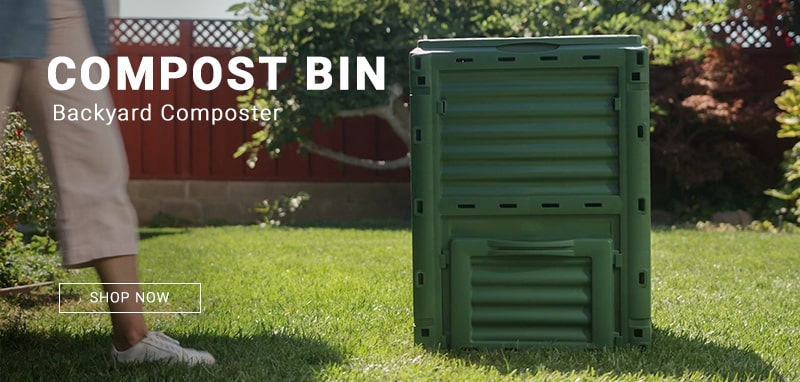Composting may be good for the environment, but an ill-maintained compost bin may earn the ire of your neighbors because of the bad smell. If you’re not managing your compost bin properly, it will stink, and it will stink to high heavens! Don’t wait until you’re getting complaints because of the foul odor. Here are ways to solve a stinky compost bin:
Contents []
What’s Causing the Stink?
A sure sign of a well-maintained compost bin is its deep earthy smell. A healthy compost should smell like dirt, it shouldn’t smell like rotting eggs.
If your compost bin gives off a putrid smell, take it as a sign that it is not heating up and breaking down properly. You'll have to look deeper into the problem to eliminate bad odors and maintain a healthy compost. Here are some of the most common reasons why a compost bin smells bad:
Reasons Why Your Compost Bin Stinks and How to Fix Them
Excess Moisture
Ever wonder why your compost bin seems to be extra stinky at the start of the spring season than any other season? It's all that extra moisture from the constant rain. Moisture reduces the oxygen level in the compost heap, which beneficial microbes need to break down the organic materials. If the compost pile is too wet, it will take a long time before it starts breaking down completely.
To solve a wet compost pile, make a habit of aerating the pile every week. Turning the pile helps even out the breakdown of the compost while also drying out sopping compost materials. If you live in a place that gets a lot of rain during the spring season, cover your compost bin after turning the pile.
It’s also smart to invest in a compost bin with a built-in cover like our Garden Compost Bin. It's an eco-friendly compost container with strategically placed holes to keep excess moisture out. It only takes a few minutes to install and requires ZERO tools to assemble.

Too Many Greens
Green composting materials like used coffee grounds, fruit and vegetable scraps, grass clippings, etc. hold a lot of moisture. These could easily mat down and leave your compost bin a soggy, stinky mess! Adding more carbon-rich, brown materials into the compost heap helps absorb moisture and restore the delicate balance between nitrogen and carbon.
Think of brown composting materials like garden scraps, shredded newspapers, cardboard, hay, straw, dry pine needles, etc., as a sponge - these absorb excess moisture and eliminate bad odors!

Meats, Fats, and Dairy
Not all kitchen wastes work as composting materials. Scrap meats, fats, and dairy products should never be used as composting materials because these foods produce a putrid stench like rotting eggs as they decay. The odor is so strong; it will attract all sorts of animals to your garden - dogs, cats, rats, raccoons, etc. Worse, decayed meats, fats, and dairy products could harbor pathogens that cause illnesses and contaminate the soil. To avoid odor problems, never add meats, fats, and dairy to your compost heap.
Lack of Oxygen
The right level of oxygen is vital to a healthy compost heap. Oxygen facilitates the decomposition of organic materials. Without oxygen, it triggers anaerobic decomposition.
Anaerobic decomposition produces a lasting stench that attracts pests and pathogens. It will take a long time for organic wastes to decompose this way. What’s more, the lack of oxygen will dry out the composting materials, causing the pile to become compacted as it produces foul odors.
To restore oxygen into your compost pile, turn the compost regularly. Use a hand rake or a compost turner to break down the matted down organic materials and add dry leaves or dry grass to prevent the materials from compacting again.
Lack of Beneficial Bacteria
Healthy compost is a living, breathing ecosystem that supports different microbes. These microbes work in harmony to break down the organic materials, turning household wastes into gardening gold. If the balance between carbon and nitrogen is off, beneficial microbes won’t thrive.
Apart from keeping the brown and green materials perfectly balanced, you should also choose the correct compost container. Trendy products like tumbling compost bins feature an innovative design, but the compost itself is not in contact with the soil. The compost is sealed in a plastic tub, which means microorganisms cannot survive to break down nor heat up the compost.
A traditional compost bin eliminates foul odors effectively because the bottom part of the compost bin is set directly on the ground. This encourages beneficial microbes to multiply and break down the organic materials.

Other Composting Tips
Shred composting materials: Shredding and chipping the compost materials speeds up the decomposition process. This reduces the chances of odor problems.
Balanced carbon and nitrogen: The green and brown composting materials should be well-balanced to avoid bad smells.
Better location: Set your compost bin in a place that gets the full sun. This will help warm up the compost heap, ensuring efficient decomposition.
While it's almost impossible to keep foul odors out when you're composting at home, the problem shouldn't be too severe that you'd get complaints about the smell from neighbors. With these tips, you can keep the odor under control and maintain a healthy compost bin. For more composting and gardening tips, check out our blog.




